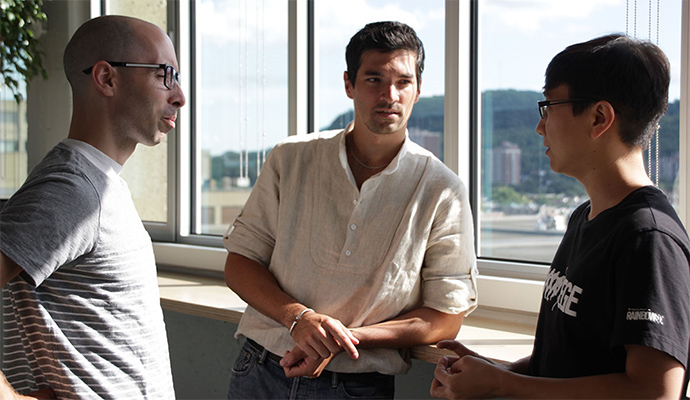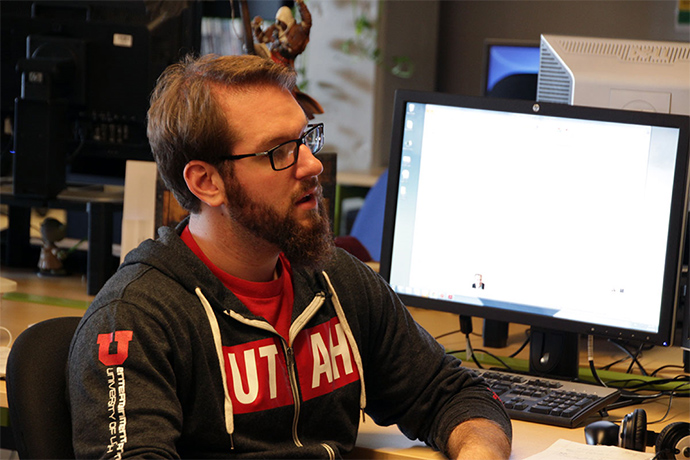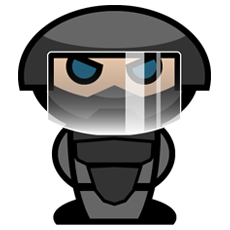Q&A with Game Designers Andrew Witts and Chris Lee
[“Behind the Wall” is a regular content series that explores various aspects of Rainbow Six Siege, based on the first demo shown. All design and content presented in these articles is a work in progress, and subject to change between now and the final release of the game.]
Over the last couple weeks we’ve been able to share some insight into the design of Rainbow Six Siege, with other members of our team chiming in to give their thoughts. Beyond just the design, we want to go even further Behind the Wall and help you get to know us a little better. They contributed to the One Life and Hostage Rescue articles, and this week we interviewed game designers Andrew Witts and Chris Lee. Witts is a lifelong Rainbow Six player and self-taught game developer who came to the project while getting his Master’s in Game Design. Lee started out with a background in Computer Science but decided he wanted to design games instead, and spent the first part of his career working on the SOCOM franchise before coming to Ubisoft for Rainbow Six. Witts and Lee have been a part of the project since the beginning, and we wanted to share their thoughts on what they do and what it’s like working on Rainbow Six Siege.
“We argue, collaborate, fight, play, and tune. That’s pretty much what we do.”
What does it mean to be a game designer?
Chris Lee: It’s quite different now. The game designer is now more specialized. Sometimes people seem to confuse the game designer with the narrative designer, who creates the story. Now there are writers who specialize in that. Game designers used to be involved in visual, but now we have artists and the level artists. As a game designer, the skill you provide is creating systems in a game and figuring out how players can have fun with them. There’s more than one aspect of game design even, but I think the core of it is the system designer.
Andrew Witts: For me it’s a pretty big thing because I just love to make games. There’s something specifically about designing games as a medium and really understanding it and making systems for it - knowing what a game is, how to define it, what makes it different from the other mediums, beyond just interactivity.
What’s an average day on the job like for you?
Lee: It changes so much.
Witts: Coffee, argue, coffee, argue, coffee, argue… [Laughs]
Lee: That’s actually every single day. It really changes depending on the project status. Right now we’re trying to write down all the core features and the non-core features into documents, and after that it’s all about making sure that these designs are getting implemented. Then it’s just testing and tweaking the game. But, as Andrew said, it is coffee, argument, coffee, argument, all day. That doesn’t change.
“There are a lot of things that make sense in real life, but trying to translate it into video games, it’s really hard to do. That is one of the most surprising things I’ve ever encountered.”
Witts: That never changes. But yeah, we’re collaborating with everybody else on the floor to make sure that core gameplay is really strong and matches the documentation that myself and others have written about. We have golden rules for weapons, and I’m testing the build to make sure that a thing like weapon recoil is really strong, and that each weapon has an identity. We also play the game every day to make sure that the mechanics are as polished as possible. We’re fighting a lot so that when the game is on the shelf next year, people will go, “Oh man, the weight of the gun feels really good,” or whatever. That’s not just because we went, “Ah, you know what, make the gun heavy,” that’s weeks, if not months, of being meticulous and almost going insane and arguing about it over coffee. That’s it for almost every feature we have.
Lee: We argue, collaborate, fight, play, and tune. That’s pretty much what we do.

Chris Lee (right) discusses the latest updates with other members of the team.
What’s one thing about your job that would surprise people if you told them?
Lee: Some things that seem so simple are actually very difficult to get right in video games, how to make them work. And people already have an assumption of how it should work, and then how it’s going to work within our own game’s context...it’s like, people have so many different opinions, it’s a constant argument.
Witts: Things like how to take a ladder up and down. Do we take one particular approach to the mechanics of that, or do we try another way?
Lee: Even simpler things, like walking down the stairs. You think it’s easy to do, but there are many implied complications.
Witts: And even rule-wise, does it cost you? Does it slow you down? Does it not slow you down? Do you turn fast or do you not turn fast? Do we make it more human or less human?
Lee: Can you crouch, can you sprint on it?
Witts: Can you prone down stairs?
Lee: There are a lot of things that make sense in real life, but trying to translate it into video games, it’s really hard to do. To me that’s one of the most surprising things I’ve ever encountered.
Witts: And then living with that decision.
Lee: It’s such a small thing. You’d think it’s so obvious, but it’s one of the hardest questions that almost always comes up in any kind of video games that I’ve worked on.
What does the name “Rainbow Six” mean to you?
Lee: It’s a game that defined a new genre, the tactical shooter. It’s the game that showed to other people that a shooter doesn’t have to be a “run around, shoot people with the rocket launchers carrying thousands of weapons on your back.” It’s a game that really showed the tactical aspect - being slow, methodical, just thinking. What we are trying to do right now is to live up to that legacy of original Rainbow 6. That’s what it means to me: it’s a genre-defining game that came out a long time ago, and it’s a really good time to bring that kind of game back.
Witts: Rainbow Six has always been, to me at least, three games for the price of one. It’s a team-based strategy game - there’s a borderline RTS aspect to the game - it does have twitch shooting if you really want to hold out and work on your marksmanship, and it has a little bit of an RPG element too, like you have party members. It’s a very unique experience in what it offers and it’s something that hasn’t been around for a while. The franchise brings expectations with it. Going back and looking at what Rainbow 6 is something that we just do on the project constantly. The name is over and above us at all times whenever we’re working on this.
“The franchise brings expectations with it. Going back and looking at what Rainbow Six is something that we just do on the project constantly. The name is over and above us at all times whenever we’re working on this.”
What’s been your most challenging moment making the game so far?
Witts: Easily destruction. Validating the destruction gameplay and making sure that it’s fun through and through was difficult because we could do so much with what we’re offered. The amount of math and tough decisions to make on certain aspects and getting everyone to see the same vision of the game we’re going to make was hard, but hey we got it approved and it’s awesome.
Lee: When you’re designing features like something like destruction, you’re not really defining what the feature can do. You’re defining what the feature can’t do. Possibilities are infinite in the real world, but to define a fun and interesting feature, and create a game system out of it, you have to set limits. Negotiating with all the parties involved on how we’re going to do that is always the toughest thing in making video games.

Andrew Witts, Game Designer.
What do you want players to take away from the game?
Lee: There’s more than just aiming and shooting in this game: like knowing where your teammates are, getting a plan together and executing that plan, or coming up with creative solutions to creating a hole and getting a drop on somebody else. Be more creative and you’re going to win more as a team. I think that’s something important for players to know and understand.
Witts: You know how you felt when you were the commander in the old Rainbow Six games and how you worked with gold team and green team or whatever? I want you to walk away and feel like you did that dynamically and on the fly, except with four other people.
Lee: And against other people!
Witts: Yeah and against five other real people.
Lee: That’s a big takeaway.
“I think all the fans out there are really going to like what we’re doing with the core gameplay of Rainbow Six. Once they get their hands on the mouse or the gamepad they’re really going to feel like they’re getting a Rainbow Six experience.”
One last thing, is there anything else you want to say to fans of Rainbow Six before we go?
Lee: There is a lot of new and innovative stuff that we’re doing. It may not be exactly what people had in mind, but we believe strongly that this is what the game needs to succeed. Also be sure to give us feedback; it’s always fun and helpful to read what people think of what they’ve seen of the game and what they’re expecting it to be.
Witts: We can honor the past and respect the past, and make you feel the way you did playing some of the older games, but we also need to push things forward. With that being said, I think all the fans out there are really going to like what we’re doing with the core gameplay of Rainbow Six. Once they get their hands on the mouse or the gamepad they’re really going to feel like they’re getting a Rainbow Six experience. Your feedback and discussion is really important to us. We’re doing things a little differently here on the Rainbow Six floor, and we can’t wait to show you what else is in store.
Stay tuned for the next “Behind the Wall” installment, coming next week here on the blog. Until then, stop by the Official Subreddit and let us know if you have any questions or feedback.
[](https://www.reddit.com/r/rainbow6)

Chase “Electr1cPanda” Straight - Community Developer, Ubisoft Montreal
Chase is a goofy American ex-pat living in Canada who loves music, DJing, blogging, and obviously gaming for hours. No discrimination here, Chase loves consoles as much as playing on his homebuilt gaming rig. Say hi and send cat pics (bonus points if they're wearing R6 gear) on Twitter at @R6ComDevs.

Genevieve "Livinpink" Forget - Community Developer, Ubisoft Montreal
Gen goes by the handle Livinpink in the gaming industry. She is known for her involvement in multiple competitive gaming communities through her work as eSports media and personality. She participates in weekly livestreamed Dungeons and Dragons sessions. She also tweets from @R6ComDevs.









